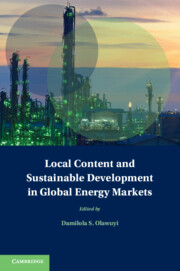Book contents
- Local Content and Sustainable Development in Global Energy Markets
- Reviews
- Treaty Implementation for Sustainable Development
- Local Content and Sustainable Development in Global Energy Markets
- Copyright page
- Contents
- Preface and Acknowledgements
- Abbreviations
- Editor
- Contributors
- Part I Introductory Context and Principles
- Part II Case Studies
- Part III Lessons Learned and Future Directions
- 19 Local Content, Community Content, and Sustainable Development in the Oil and Gas Industry: Perspectives from Legislation, Policy, and Community Development Agreements
- 20 Local Content Requirements and Social Inclusion in Global Energy Markets: Towards Business and Human Rights Content
- 21 Advancing Sustainable Development in Local Content Initiatives: Summary for Policy Makers
- Index
19 - Local Content, Community Content, and Sustainable Development in the Oil and Gas Industry: Perspectives from Legislation, Policy, and Community Development Agreements
from Part III - Lessons Learned and Future Directions
Published online by Cambridge University Press: 05 March 2021
- Local Content and Sustainable Development in Global Energy Markets
- Reviews
- Treaty Implementation for Sustainable Development
- Local Content and Sustainable Development in Global Energy Markets
- Copyright page
- Contents
- Preface and Acknowledgements
- Abbreviations
- Editor
- Contributors
- Part I Introductory Context and Principles
- Part II Case Studies
- Part III Lessons Learned and Future Directions
- 19 Local Content, Community Content, and Sustainable Development in the Oil and Gas Industry: Perspectives from Legislation, Policy, and Community Development Agreements
- 20 Local Content Requirements and Social Inclusion in Global Energy Markets: Towards Business and Human Rights Content
- 21 Advancing Sustainable Development in Local Content Initiatives: Summary for Policy Makers
- Index
Summary
This chapter examines the critical distinctions between the measures that are regarded as part of local content including local content requirements (“LCRs”), community content initiatives, and community development agreements (“CDAs”). It analyzes these distinctions from the lens of the sustainable development goals (“SDGs”). The chapter argues that it is necessary to clearly delineate the scope of each initiative in order to appropriately assess their contributions, if any, to the SDGs. This is especially relevant given that what currently entails is a muddying of mechanisms that have developed as state-led LCRs which mostly apply nationally, mostly industry-led CDAs, and some recent efforts at developing community content guidelines. This chapter argues that instead of assuming that legislated/policy mandated LCRs, community content initiatives, and negotiated or standard form CDAs serve the same functions in practice or transposing the functions of one on the other, it is necessary to systematically and intentionally reflect on their contributions to locally beneficial natural resource development. Essentially, while there appears to be developing understanding of the relationship between local content and local communities, there remains a need to clearly articulate visions for the different forms of engagement with host and impacted communities in the oil and gas industry, either as separate nationally-focused LCRs, specific community content policies, CDAs, or to clearly develop these as part of a single bundle of engagement with well-defined parameters. Hence, it is necessary to be more deliberate about conceptualizing and contextualizing the relationship between and purpose(s) of LCRs and other initiatives that appear to serve similar purposes in communities. In light of the fact that the SDGs are crafted in the nature of ‘goals,’ it is crucial to critically distinguish whether local content in the broad sense or each initiative that is being regarded as part of local content are meeting/meet the SDGs.
- Type
- Chapter
- Information
- Publisher: Cambridge University PressPrint publication year: 2021



